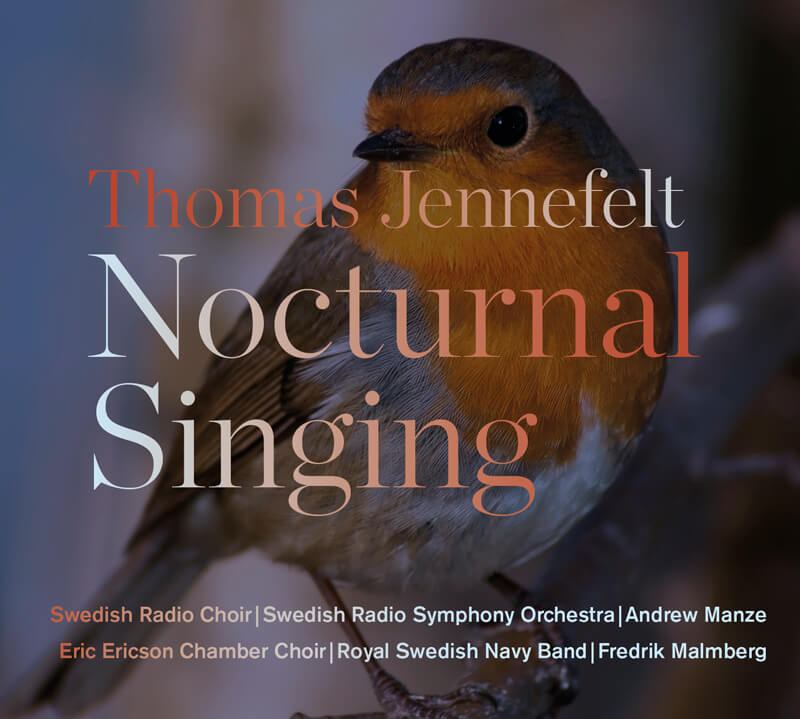Nocturnal Singing
Thomas Jennefelt Eric Ericsons kammarkör Radiokören
Kategorier: Footprint Records, Profan | Secular, CD, Blandad kör | Mixed choir
149.00 SEK
Information
GRAMMISNOMINERAD 2018
Composer portrait of Thomas Jennefelt.
Nocturnal Singing (Jessica Bäcklund, Swedish Radio Choir, Swedish Radio Symphony Orchestra, Andrew Manze)
Fyra operakörer / Four opera choruses (Eric Ericson Chamber Choir, Royal Swedish Navy Band, Fredrik Malmberg):
De bortkördas kör / Chorus of the Deported
Midsommarnatten / Midsummer Night
På festen / Am Party
Slutkör / Final Chorus
”När jag hörde uruppförandet av Thomas Jennefelts ’Nocturnal singing’ på radion sent i november 2010 blev jag så suggererad att jag för en sekund såg ut genom fönstret för att försäkra mig om att inte också hela staden låg i mörker. Nu finns detta körmästerverk på ett album som också bjuder på hisnande vokala fantasier till fyra tänkta operor: ’De bortkördas kör’, ’Midsommarnatten’, ’På festen’ och ’Slutkör’.
Här ställer Jennefelt ordens semantiska hårdhet mot en mjukhet i det meningsbefriade språk som bara musiken själv kan alstra. Som i den underskönt magiska ’Midsommarnatten’ där en ursvensk ritual rekonstrueras utifrån en avlägsen framtid med hjälp av ihopklippta folkvisetexter som ingen längre vet vad de betyder.” – Martin Nyström, Dagens Nyheter
Down through the years, THOMAS JENNEFELT has composed music for a wide variety of settings, but attention to vocal music is salient in his works, which extend from choral music to opera. Warning to the rich is an early and successful example of the former, and has been performed the world over since its inception in 1977. Other acclaimed choral pieces include O Domine and Dichterliebe (I–X), composed to the same poems by Heinrich Heine that Robert Schumann once used, and the original a cappella suite Villarosa Sequences sung to a self-created, Latinesque language.
A piece such as Villarosa Sequences certainly adds dimensions to Jennefelt’s creative repertoire. Besides being a singer himself, a former member of the prestigious Eric Ericson Chamber Choir, his vocal music demonstrate a deep interest in language. He often writes his own librettos and shows great sensitivity for the value of words.
His musical narratives are often populated by clear-cut characters and strong contrasts – displaying a rare talent for simple details that yield a great impact. Melodic lines and organic rhythms provide what is almost a visceral experience. The sweeping brush strokes of drama are parsed by detailed and intimate passages, such as in the melancholy NocturnalSinging (2010) and the demanding, yet dreamy and sensuous Fyra operakörer/Four Opera Choruses (2016), taken from as-yet unwritten operas.
Many of his delicate works for choir have earned international popularity, with their abundant use of a full potential profusion of choral sonority, often underpinned by a distinct rhythm. These features, along with a decidedly free-tonal character imbued with a melodic lyricism, are also detectable in his instrumental works. Worthy of mention are the exquisite trumpet concerto Stockholm i maj /Stockholm in May (2000) and the elements of light in the orchestral piece In rilievo (2005).
Jennefelt’s multifaceted and vocally sensitive composition is particularly suited to musical drama. Notable amongst his operas are the full-length Gycklarnas Hamlet /The Jesters’ Hamlet (1989), the chamber opera Farkosten/ The Vessel (1994), to which he set his own libretto, and several other musical drama scenes for different sizes of orchestra. He also wrote Sport och fritid/Sports & Leisure for the Stockholm Royal Opera to a libretto by Niklas Rådström. The chamber opera Hos oss/At Our Place (2012), with a libretto by Magnus Florin, is very cutting-edge with its focus on authenticity, being performed in private apartments in Stockholm, and later, Berlin. – Tony Lundman

